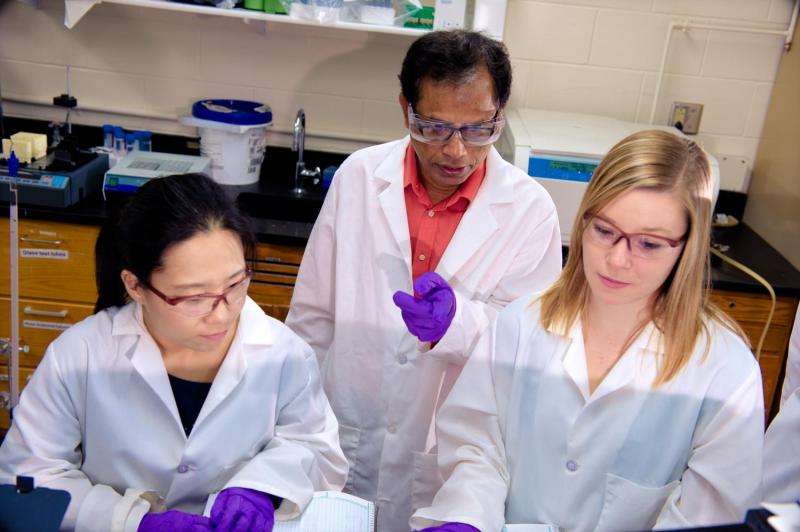Thyroid cancer biomarker assays may show inaccurate readings

Protein biomarkers are used to test for cancer before and after surgeries to remove tumors. To test thyroid malignancy, many biomarkers are tested separately to confirm cancer. However, new research from Michigan Technological University shows that the detection tests that measure two major biomarkers to diagnose thyroid cancer may be inaccurate. The study recently came out in the journal Thyroid, published by the American Thyroid Association.
One biomarker, thyroglobulin (Tg), is a glycoprotein that has sugar in its molecular structure. It's "candy-coated" says Tarun Dam, an assistant professor of chemistry at Michigan Tech who led the research. He points out that the second biomarker, galectin-3 (Gal-3) is not a glycoprotein, but "it has a sweet tooth."
And like a kindergartner on Halloween, Gal-3 can't resist Tg. The two proteins tend to clump, an interaction not accounted for in the current thyroid cancer detection assays.
Sugars, Proteins and Cancer
As biochemists, Dam and his research lab group usually look at the biomechanics of interactions between glycoproteins and their partners. That is, they look at how these candy-coated proteins interact with other molecules and their environment. Dam's doctoral students Ni Fan and Melanie Talaga co-led the study looking at thyroid cancer biomarkers.
The clumping cycle of Tg and Gal-3 is fairly straightforward from a biomechanics perspective. A thyroid cancer cell secretes Tg and Gal-3, and the much smaller sweet-tooth nabs part of the glycoprotein. More than a dozen Gal-3 can bind to a single Tg. Then as more Tg is secreted, the influx partially breaks up the larger clumps. The body can potentially remove some these leftover globs quickly, taking away some of the biomarkers before samples are taken from the patients.
Currently, assay tests look at the protein biomarkers separately. They have no way to account for the proteins that may be tied up or removed in clumps. Plus, there is no way to know what stage of the clumping cycle the Tg and Gal-3 are in; they could be in a big clump, already metabolized, partially dissolved or mostly free. Similar problems have been observed with thyroglobulin autoantibodies (TgAb), forming a Tg-TgAb clump. Based on his team's findings, Dam suggests adding a step to break up the clumps before running the detection tests.
Dam and his team tested the physical and biochemical properties of the biomarkers to ensure this clumping cycling was driven by the proteins' interactions. The team included doctoral students Fan and Talaga; Pumima Bandyopadhyay, a research assistant professor of biology; and master's students Robert Brown and Ashli Fueri. Dam hopes to run tests on thyroid cancer cells using cell lines, or cultured cells with matching genetics, in the future.
Beyond Thyroid Cancer
The study specifically looks at thyroid cancer biomarkers, but similar biomechanical interactions could be happening in ovarian, breast, lymphoma, prostate and other types of cancer cells.
"The lesson is before you make a final conclusion, make sure the sample did not a have cluster," Dam says. "This is biophysics, it's not theoretical, and many kinds of cancer biomarkers are candy-coated glycoproteins and most of these cancer cells also produce the sweet tooth Gal-3."
The next step, Dam says, is to look at these other glycoprotein biomarkers in different cancer cells and to observe the clumping cycle in thyroid cancer cells. Meanwhile, Dam is hopeful that a simple change in the assay process could improve their accuracy.
More information: Ni Fan et al. Glycan-Dependent Mutual and Reversible Sequestration of Two Thyroid Cancer Biomarkers, Thyroid (2015). DOI: 10.1089/thy.2015.0105

















